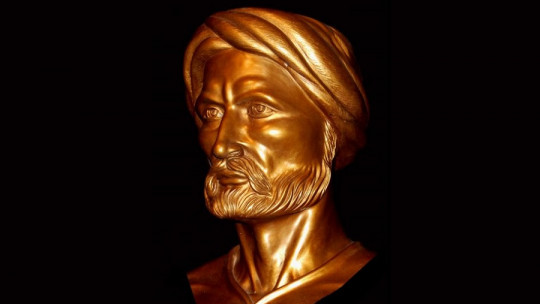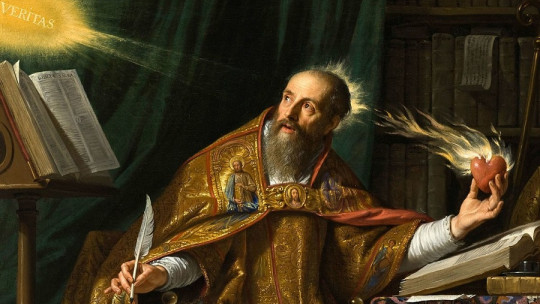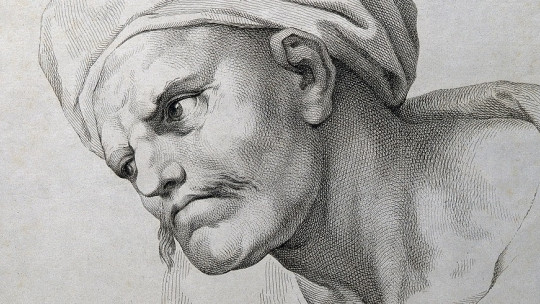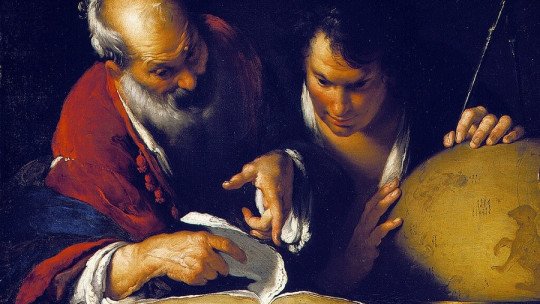
Ibn Khaldun was a Tunisian historian, sociologist, philosopher, economist, geographer and demographer born in the 14th century into an honorable family of Andalusian origin.
His life was marked by all kinds of intrigue and jealousy of the courtiers of the many Islamic kingdoms that he frequented, giving advice and supervising the decisions of sultans throughout North Africa.
Considered one of the great medieval Muslim thinkers, this intellectual is studied as a great reference in the history of Islam, sociology and Muslim philosophy. Here you will find a biography of Ibn Khaldun in summary format.
Brief biography of Ibn Khaldun
Known in Spanish as Abenjaldún or Ibn Jaldún, Ibn Khaldun was a Tunisian historian of Andalusian origin whose work, especially his “Prolegomena” has contributed not only to knowing the history of the medieval Islamic world but also to having a vision of sociology different from the classical Western one, in addition to being one of the few Muslim scholars who was motivated to write his own biography and describe how the environment influences human communities.
Ibn Khaldun’s life was very busy, basically because the moment he went to live in a new city the local nobility ended up having a certain mania for seeing how influential he became before the sultan, emir or monarch of his new place of residence. . His life was marked by envy and palace intrigue, jealousy that led him to exile, prison and deportation on more than one occasion.
Early years
Ibn Khaldun, whose full name is Abū Zayd ‘Abdu r-Raḥman bin Muḥammad bin Khaldūn Al-Hadrami, was born on May 27, 1332 in the city of Tunis. We have the data we have about his life thanks to the fact that he, as a historian, wrote his autobiography, a fact that was quite uncommon in his time, especially in the Arab world.
His family was noble, of Andalusian origin and had a very ancient lineage, originating from Hadramaut a kingdom that existed in the Arabian Peninsula until the 3rd century AD. Their ancestors had moved to the lands of Al-Andalus, going first to Carmona and then to Seville, but due to the Reconquest the Banu Khaldun family chose to emigrate to Ceuta and then Tunisia, the city where Ibn Khaldun would be born.
His early years were spent in the same city where he was born, where he received a careful education in accordance with the important status of his family. His father served almost all of his life at the court of the Hafsids of Tunisia, a dynasty that ruled the city not without having important enemies.
The young Ibn Khaldun, in addition to the Koran and the Hadit under the tutelage of the most important scholars of the city, studied philosophy and social sciences, Arabic literature and the extensive life of the Prophet Muhammad, facts that would make him a prolific philosopher in his adulthood. . These years would be very happy for the young man, enjoying the pleasures of a good education and the privileged position of his family.
However, in the year 1349 at the age of 17 he saw how misfortune stalked his land. His parents and teachers would perish due to a plague epidemic that hit the city of Tunisia leaving him and his brothers Muhammad and Yahya orphans.
Political beginnings
Ibn Khaldun’s political career began as a khatib, that is, the person who delivers the sermon during Friday prayers, in the service of Sultan Abu Ishaq, who had proclaimed himself the restorer of the Hafsid dynasty in Tunisia after a brief intermission. in 1349 perpetrated by the enemy dynasty of the Benimerines.
After this event, a new stage would begin in the life of the young Ibn Khaldun, leading him to work at the service of the most important sultans of medieval Muslim Africa after Abu Ishaq. After this he left the city and lived in the fortress of Bugía and from there he moved to the Merinid court of Fez, receiving a magnificent welcome from Sultan Abu Inan in 1354 where he would continue his studies and be declared secretary of the sultan’s orders.
However, his sudden rise provoked envy in the palace, envy that led him to be accused of maintaining contacts with Muhammad, a Hafsid prince who wanted to regain power in several places conquered by the Benimerins. Because of this, Ibn Khaldun and Prince Muhammad would end up being imprisoned and the young sage would not be released until the death of Abu Inan in 1358. Fortunately, when he was released, all his honors were restored.
Ibn Khaldun wanted to return to his hometown, but did not get permission to do so. However, life smiled a little on him and thanks to contacts with Aben Marzuk, he managed to enter the party of the candidate to the throne Abu Salem, brother of Abu Inan, who in 1359 had occupied the throne of Fez, replacing the new monarch placed after the death of his brother.
In this age Ibn Khaldun was in charge of writing all the correspondence of the new sultan and, for a time, he was able to greatly influence Abu Salem until Aben Marzuk rose at court and monopolized the ruler’s entire attention. It was also in the year 1359 that Ibn Khaldun collaborated with the king of Granada Muhammad V, of the Nasrid dynasty, who had been dethroned from his kingdom and had taken refuge in Fez.
Ibn Khaldun spoke with his sovereign to help the refugee king with whatever he needed to recover his Hispanic kingdom, which would occur a year later. This would be greatly appreciated by Muhammad V, who would accept Ibn Khaldun at his court some time later.
Shortly before the death of Abu Salem, Ibn Khaldun He was appointed supreme judge to give justice to those who had received offenses from the most powerful and could not be tried by ordinary courts When the sultan died, Ibn Khaldun saw the hostility towards him from Omar ibn Abdallah, the wazir of the new sultan, which made him decide to leave Fez and move to Spanish lands.
In Al-Andalus
On his trip to Al-Andalus he would pass through Ceuta and then Gibraltar in 1362, a route that his ancestors had traveled but in the opposite direction. He would soon arrive in Granada, where Muhammad V would gladly accept him into his court and she would soon become his most faithful confidant.
The wazir of the Granada king, Aben Aljathib, would be much friendlier than the one from Fez, having a good relationship with Ibn Khaldun. The Granada sultan rewarded Ibn Khaldun with a farmhouse in Elvira, present-day Granada where he lived for a time with his family who ordered to come from Tunisia.
This time would be prosperous for Ibn Khaldun since the king of Granada would entrust him with important diplomatic tasks, including traveling to Seville in 1363 to ratify a peace treaty with Peter I of Castile, a monarch to whom Muhammad V paid pariahs. Despite being an “enemy,” Peter I saw Ibn Khaldun as a great wise man and, in fact, invited him to join his side after knowing the importance that their ancestors had had in the Peninsula. The wise Arab rejected the offer but Pedro I of Castile showered him with all kinds of gifts.
But just as had happened to him at the court of the sultan of Fez, Ibn Khaldun would suffer the same fate in Granada. His influence with Muhammad V was growing enormously and in 1365 he was pressured to leave Spain when he learned that the wazir Aben Aljathib was already beginning to be jealous Despite the fact that Muhammad V himself asked him to stay at his court, Ibn Khaldun traveled to Almería and, after two weeks of travel, arrived at Bugía, a place where Muhammad himself of the Hafsid dynasty had just recovered the power of he.
At the court of Muhammad of Bugía he would receive the positions of chamberlain and preacher of the great mosque, in addition to teaching as a professor of jurisprudence. He would also have the opportunity to accompany Muhammad in some of his military contests, in one of which this Muslim monarch would lose his life in 1366. It would be then that Ibn Khaldun would receive the offer to take care of the affairs of the state and proclaim one of the children of the previous monarch as the new sultan, an offer he would not accept.
Instead of accepting it immediately, the wise man contacted the lord of Constantine and cousin of the late emir, Abu-l-Abbas, to whom he offered the government of Bejaia. Although Abu-l-Abbas would take possession of the city and accept Ibn Khaldun at his court, the wise man felt rejected and decided to move to Biskra, being welcomed by the lord there, Ahmed ibn Monzi.
In 1374 he traveled again to Granada, where at first he was received kindly by his former friend Muhammad V. However, this monarch would receive reports from Fez in which Ibn Khaldun was described as a very dangerous guest, so he ordered that He was imprisoned and finally expelled to Honain, near Tlemcen, where he was not well received at first. However, Ibn Khaldun managed to gain the trust of the city lord, who would eventually entrust him with diplomatic missions.
Return to Africa
Subsequently He retired to Calta Ben Salama, in Algeria, where he spent four years writing one of his most important works, “The Prolegomena” or “Muqaddimah.” In his autobiography he tells us that it was at this time that he would suffer a serious illness but that, apparently, he was saved thanks to divine intervention, something that would give strength to his Muslim beliefs.
In 1378 he returned to Tunisia where he was welcomed by the sultan’s court and, once again, he once again stood out and aroused the envy of the other courtiers. In fact, it would be one of his former disciples, called Ibn Arafa, who would dedicate numerous infamies to him, which caused the court to take a stand against Ibn Khaldun, something that motivated this philosopher to leave his hometown again and make a pilgrimage to La Mecca.
He left Tunisia at the end of 1382, arriving in Alexandria in December and shortly afterwards in Cairo There he had a good reputation and managed to win the affection of a group of disciples eager to receive his numerous teachings. He would again teach jurisprudence in one of the city’s mosques.
He tried to get his family to Egypt, but the request was denied by the Sultan of Tunisia, who wanted him to return at all costs. He would eventually get his family to travel to his new residence but, unfortunately, his misfortune would strike him again. During the trip, the ship in which his relatives were traveling was shipwrecked due to a storm and everyone would perish in the sinking This caused tremendous pain to the wise man Ibn Khaldun, who took refuge in Islam and study as a way to channel his pain.
Last years
In 1400 Ibn Khaldun He was part of the expedition initiated by the ruler of Cairo to fight against the expansion of Tamerlane, a Mongol leader, who was conquering numerous positions in Syria. On this trip Ibn Khaldun would be trapped in Damascus and would actually meet Tamerlane in person. The Mongol conqueror was impressed by the knowledge of Ibn Khaldun, a wise man who had no problem showing him some of his work.
Ibn Khaldun managed to return to Cairo after his stay in Syria, and was named Great Maliki Cadi of Egypt in that city a few more times. This position, which he did not like very much, he would hold until a short time later, when he died on March 19, 1406 at the age of 73.
His work and intellectual legacy
Ibn Khaldun has been a scholar whose works have made a great contribution to the field of sociology and philosophy, although unfortunately not many of them are preserved. He was the author of numerous works of law, literature, religion and philosophy, although his work as a historian has been of enormous help in understanding the history of Islamic countries and his medieval vision on this issue.
Kitab al-Ibar
this thinker He left written a detailed genealogy of the Muslim dynasties of North Africa known as “Kitab al-Ibar” or “Universal History.”, a work of great importance for understanding the Islamic monarchies of the Middle Ages that consisted of seven volumes although it would only be the first that would make him gain fame: “Muqaddimah” or “Prolegomena”. Such has been the impact of this first volume that for two centuries it has been published separately from the rest of the work, basically because in this part Ibn Khaldun condenses all of his thoughts.
This part of the work could be defined as an introduction to the work of the historian, who had created an encyclopedia where he synthesized the methodological and cultural knowledge necessary to describe history based on scientific criteria. It carries out a complex analysis of society, seeking to understand the foundations of social behavior and how historical development occurs It is really a great work from a sociological perspective.
This part is divided into six chapters. In the first he talks about society, the physical world where communities live and how the environment influences them. In the second he tells us about the most rural and simple societies. The third analyzes the ways in which governments and states apply their laws, using different types of institutions and controlling human communities. In the fourth he delves into urban and more developed societies. In the fifth he talks about humanity in general and in the last he talks about ways to transmit culture and the arts.








